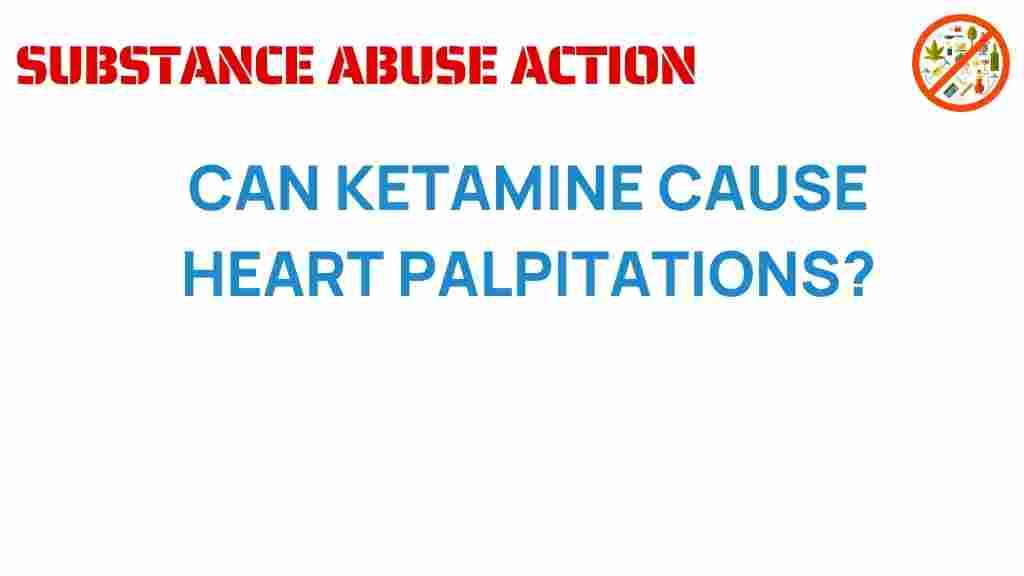Unraveling the Mystery: Can Ketamine Trigger Heart Palpitations?
Ketamine, originally developed as an anesthetic, has gained attention in recent years for its potential therapeutic effects on mental health issues, particularly anxiety and depression. However, with its growing use in clinical settings, questions have arisen regarding its safety profile, especially concerning heart palpitations. This article aims to explore the relationship between ketamine and heart palpitations, examining the clinical research, potential side effects, and patient safety considerations.
Understanding Ketamine and Its Uses
Ketamine is a dissociative anesthetic that has been used in medical settings since the 1960s. More recently, it has been repurposed in lower doses for treating various mental health disorders, including:
- Anxiety
- Depression
- Post-Traumatic Stress Disorder (PTSD)
- Obsessive-Compulsive Disorder (OCD)
With its rapid onset of action, ketamine can provide relief for individuals who have not responded to traditional antidepressants, making it a valuable option in mental health treatment.
The Mechanism of Action
Ketamine primarily works as an N-methyl-D-aspartate (NMDA) receptor antagonist, which impacts the brain’s glutamate system. This action can lead to increased synaptic plasticity and promote the growth of new neural connections, potentially alleviating symptoms of depression and anxiety.
Heart Palpitations: What Are They?
Heart palpitations are sensations of feeling your heart beating, fluttering, or pounding. While they can be harmless, they can also indicate underlying health issues. Common causes of heart palpitations include:
- Stress and anxiety
- Caffeine or stimulant consumption
- Medications
- Underlying heart conditions
Understanding the relationship between ketamine and heart palpitations is crucial for ensuring patient safety, especially for those with pre-existing heart conditions or anxiety disorders.
Can Ketamine Trigger Heart Palpitations?
The question remains: can ketamine trigger heart palpitations? Research indicates that while ketamine is generally well-tolerated, it can cause cardiovascular side effects in some patients. The likelihood of experiencing heart palpitations may be influenced by several factors:
- Dose: Higher doses of ketamine are more likely to produce side effects.
- Administration Method: Intravenous (IV) ketamine may have different effects compared to intranasal or oral forms.
- Individual Sensitivity: Some individuals may be more sensitive to ketamine’s effects, leading to increased heart rate or palpitations.
- Pre-existing Conditions: Patients with a history of heart issues or anxiety disorders may be at greater risk.
Clinical Research on Ketamine and Heart Palpitations
Clinical research has explored the cardiovascular effects of ketamine. A study published in the Journal of Clinical Psychiatry found that while most patients experienced no significant cardiovascular events, some did report transient cardiovascular changes, including increased heart rate and blood pressure. Heart palpitations were noted in a minority of cases, often linked to the patient’s anxiety or the ketamine dose.
Another study published in Biological Psychiatry indicated that ketamine’s effects on heart rate and blood pressure were generally mild and resolved quickly. The authors concluded that ketamine could be administered safely in a controlled environment, but they emphasized the importance of monitoring patients during treatment.
Side Effects of Ketamine Treatment
While ketamine can be an effective treatment for mental health disorders, it’s essential to be aware of the potential side effects. Common side effects of ketamine include:
- Dissociation or altered perception
- Increased heart rate
- Elevated blood pressure
- Confusion or hallucinations
- Nausea
Heart palpitations may occur as a side effect, particularly in patients who are anxious about the treatment or have underlying heart conditions. It is vital for healthcare providers to assess each patient’s risk factors before initiating ketamine therapy.
Patient Safety and Precautions
Ensuring patient safety during ketamine treatment involves several key precautions:
- Comprehensive Assessment: Conduct a thorough evaluation of the patient’s medical history, including any cardiovascular issues or anxiety disorders.
- Monitoring: Closely monitor vital signs, including heart rate and blood pressure, during and after the administration of ketamine.
- Patient Education: Inform patients about potential side effects, including heart palpitations, and encourage them to report any concerning symptoms.
- Emergency Protocols: Have protocols in place for managing any adverse reactions that may arise during treatment.
Troubleshooting Tips for Patients Experiencing Heart Palpitations
If you experience heart palpitations while undergoing ketamine treatment, consider the following troubleshooting tips:
- Stay Calm: Anxiety can exacerbate palpitations. Focus on deep, controlled breathing to help reduce anxiety levels.
- Hydration: Ensure you are well-hydrated, as dehydration can contribute to heart palpitations.
- Avoid Stimulants: Limit caffeine and other stimulants before treatment, as they can increase heart rate.
- Communicate: Inform your healthcare provider about any palpitations or discomfort you experience during treatment.
Conclusion
In conclusion, ketamine has emerged as a promising treatment for various mental health disorders, offering hope for those struggling with anxiety and depression. While it can trigger heart palpitations in some patients, particularly those with pre-existing conditions or anxiety, the overall risk is manageable with appropriate precautions.
As with any treatment, patient safety should remain a priority. Continuous clinical research is essential to better understand the effects of ketamine on the cardiovascular system and to refine treatment protocols. If you or someone you know is considering ketamine treatment, discuss any concerns regarding heart palpitations with a healthcare professional. With informed care, ketamine can be a valuable tool in the journey towards improved mental health.
For more information on mental health treatments, you can visit this resource.
This article is in the category Treatment and created by SubstanceAbuseAction Team
